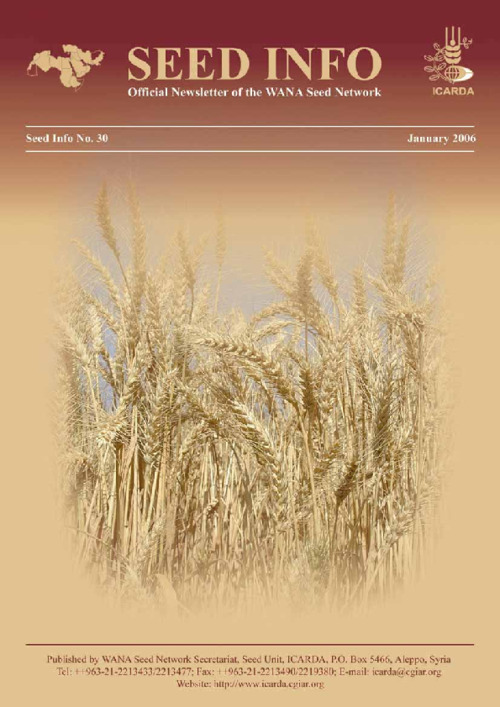Seed Info No. 30
Abstract
Seed Info aims to stimulate information exchange and communication among seed staff in the Central
and West Asia and North Africa (CWANA) region. The purpose is to contribute towards the development of
stronger national seed programs which supply quality seed to farmers.
In this issue of Seed Info we report on International Seed Trade Conference 2005 for the CWANA Region held from 29 November to 1 December 2005 in Antalya, Turkey. It was the first international seed trade conference organized by the Turkish Seed Industry Association and the Seed Unit of ICARDA in which 222 persons from over 40 countries of Asia, Africa, Europe and the Americas participated. Your editor, Zewdie Bishaw and colleagues will provide a detailed report on the conference.
N.P. Louwaars, our regular contributor from Wageningen University and Research Center (Wageningen UR), is revisiting the impacts of the International Plant Genetic Resources Treaty, i.e. the Convention on Biological Diversity (CBD) and International Treaty on Plant Genetic Resources for Food and Agriculture (IT PGRFA) on the seed industry. He explores the existing mechanisms and constraints in getting access to genetic resources. We also bring you news on the Global Crop Diversity Trust (GCDT), the International Seed Testing Association (ISTA), the International Convention for the Protection of New Varieties of
Plants (UPOV) and the status of biotech crops in 2005.
The section on SEED PROGRAMS includes news from Afghanistan, Ethiopia and Australia. The news from Afghanistan presents the approval of a national seed policy on 13 September 2005, following an official signing ceremony presided over by H.E. Mr. Obaidullah Ramin, Minister of Agriculture, Animal Husbandry and Food (MAAHF). The news from Ethiopia reports on the establishment of the Agricultural Biotechnology Research Institute and the endorsement of breeder’s and farmers’ rights. The Institute is expected to tap into the country’s diverse genetic resources and serve as a biotechnology center for training young African scientists from the region.
The country report from Australia presents news on collaborative research between ICARDA and Australia including the release of chickpea varieties from germplasm supplied by ICARDA. 
In the HOW TO section, Abdoul Aziz Niane discusses the options for technology transfer of varieties bred through participatory plant breeding. We invite our readers to contribute to this debate and share with us their practical experience in participatory plant breeding and technology transfer options.
The RESEARCH section is aimed at capturing information on adapted research or issues relevant to seed program development in the region or elsewhere. Daniel Danial and Pim Lindhout from Laboratory of Plant Breeding of the Wageningen UR describe the experiences of El Proyecto de Resistencia Duradera en la Zone Andina (Preduza) project supported by the Netherlands. The project is aimed at developing crop varieties with durable disease resistance for marginal areas and resource poor farmers in the Andean Highlands of Bolivia, Ecuador and Peru using farmer participatory approaches. The Preduza approach is illustrated using the case of Saraguro in Ecuador.
Seed Info encourages exchange of information to broaden our understanding of issues that affect the
global, regional and national seed industry

